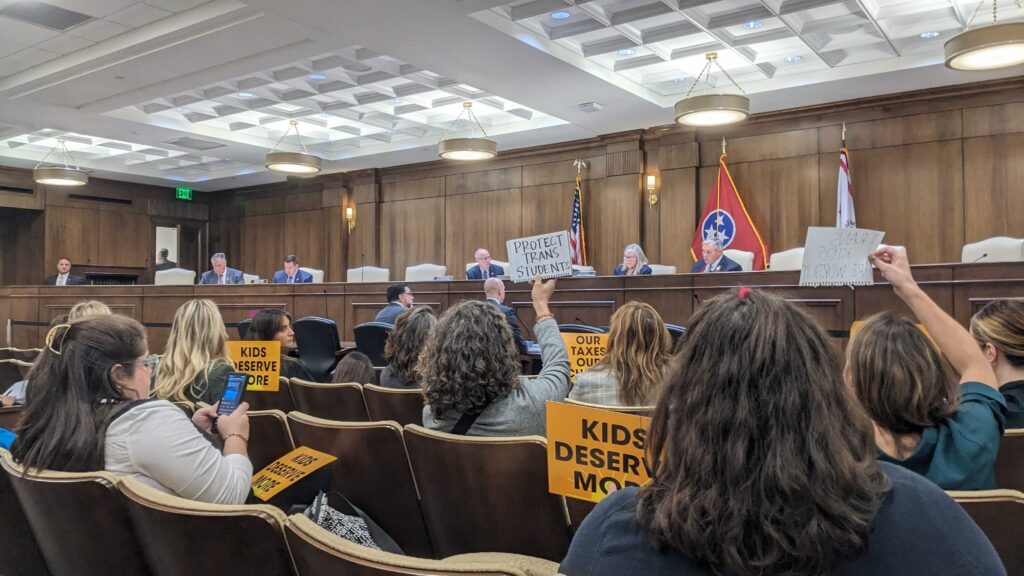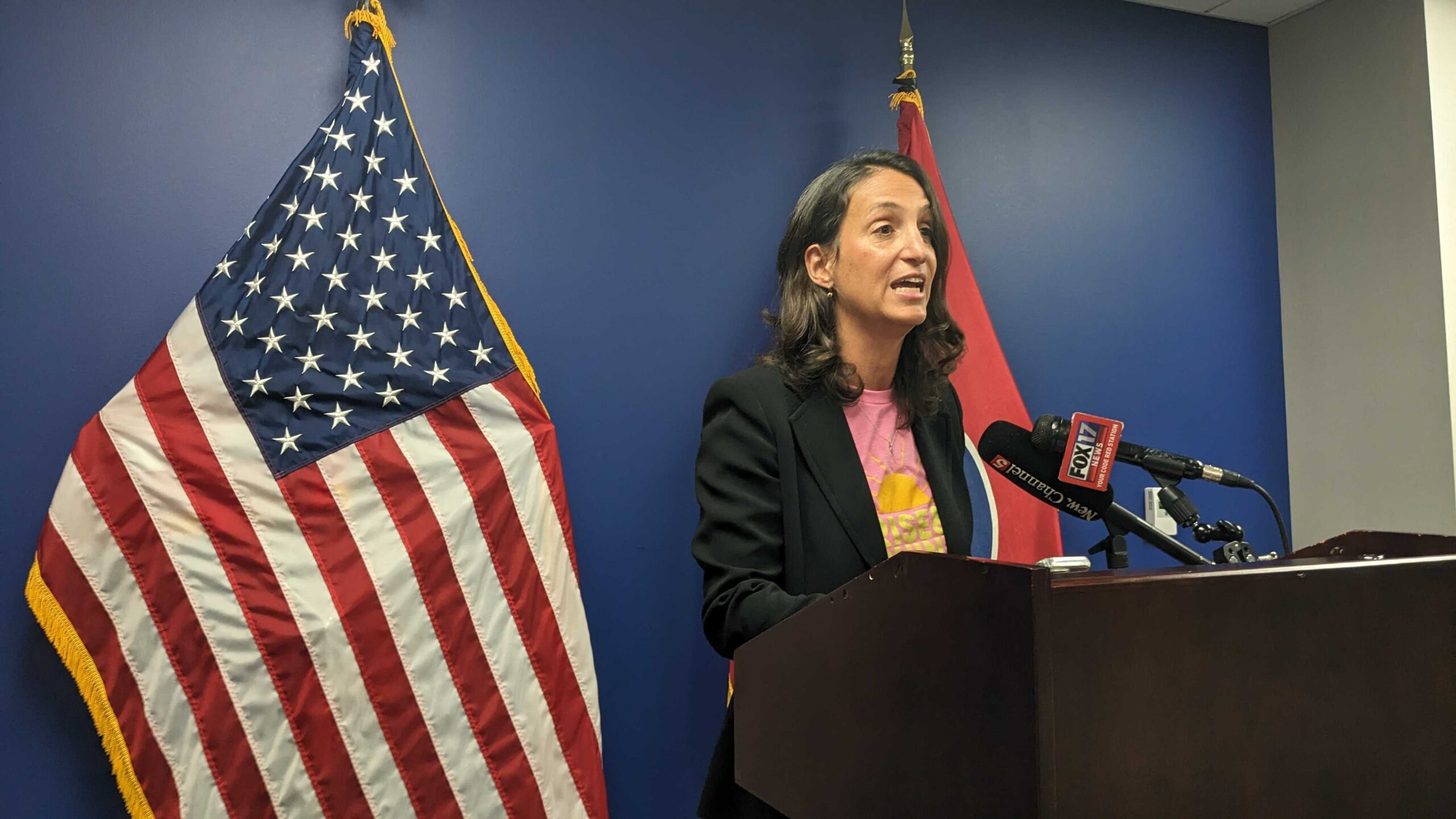
The Tennessee task force considering rejecting more than $1 billion per year in federal education funding spent its second week hearing from the Tennessee Department of Education, state researchers and representatives from out-of-state think tanks.
Tennessee would be the first state to reject these federal education funds.
Today, the majority of the money goes toward programs that serve low-income kids and students with disabilities. Republicans have said the state would replace the federal dollars with state money and eliminate unwanted “strings” that come with federal dollars. They haven’t been explicit about what those strings are.
In its first meetings last week, the body questioned nonpartisan groups, researchers and school district leaders. This week, however, two speakers broke that mold and likely reinforced some parents’ fears that the unwanted “strings” associated with federal education money are actually civil rights protections for transgender students and education workers.
Parents voice concerns about civil rights protections
Members of the grassroots advocacy group Rise and Shine Tennessee, which formed in the aftermath of the Covenant School shooting in March, say they’ve been “excluded” from the conversation around federal funding.
Last week Senate co-Chair Jon Lundberg told Chalkbeat that local advocacy groups have not been tapped to testify because the working group is focusing on the requirements associated with federal dollars, not discontinuing services.
Wednesday, members of Rise and Shine Tennessee held a press conference sharing why they believe the state should continue accepting the federal education dollars.
One through-line of their messages: Federal money ensures protections for vulnerable students.
 Alexis Marshall WPLN News
Alexis Marshall WPLN NewsRise and Shine Tennessee founder Maryam Abolfazli speaks at a press conference.
Multiple mothers referenced the supports for students with disabilities guaranteed by the Individuals with Disabilities Education Act, or IDEA. Rise and Shine Tennessee founder Maryam Abolfazli talked about the protections provided for her African- and Iraninan-American son by Title VI of the 1964 Civil Rights Act.
“As his mother, I feel safe and secure that there is a law above all laws that protect him from being discriminated against by anyone in his classroom from now until he graduates,” Abolfazli said. “If I didn’t have that, I wouldn’t have a recourse.”
Erica Bowton discussed the importance of Title IX protections for her daughters, and also for LGBTQ+ youth. And she questioned whether that could be part of the state’s motivation for potentially rejecting these funds.
Bowton pointed to a proposed Title IX rule change earlier this year that would allow transgender students to participate on school athletics teams consistent with their gender identity. That contradicts a Tennessee law banning trans youth from participating in girls’ sports.
“I have very real concerns that some Tennessee lawmakers would rather reject nearly $2 billion than simply comply with nondiscrimination rules set forth by the federal government,” Bowton said.
Those concerns were likely reinforced by the testimony of Sal Nuzzo from a Florida-based think tank, The James Madison Institute. On its website, the group says it advocates for “limited government.”
He addressed the task force Wednesday afternoon, although only four Republican House members of the 10-member working group showed up for the final presentation. A Senate spokesperson said all members of that chamber had scheduling conflicts.
Nuzzo pointed to proposed rules from the Equal Employment Opportunity Commission that directly conflict with a Florida law regarding the use of pronouns and restrooms that align with workers’ gender identities.
He explained that if EEOC rules are passed, Florida schools could either follow state law, risking a federal lawsuit, or follow federal policy, and risk losing state funding.
“Sadly, these (are) examples of how the strings attached impact state and local education policies and the state’s legal latitude to align its education policies with the state’s values,” Nuzzo said.
Wednesday’s final panel also included testimony from Steve Johnson of the Center for Practical Federalism.
During his presentation, Johnson encouraged lawmakers to “jealously guard the authority that you have as a state.”
“We want to help you push back against federal overreach and against federal coercion,” Johnson said.
Tennessee Department of Education weighs in
Tuesday, lawmakers heard from leaders of the state’s education department. TDOE emphasized the many unknowns associated with rejecting federal education funds. Their presentation also touched on many of the concerns lawmakers surfaced in the first set of meetings, including the costs of administering federal programs and food waste.
Lawmakers have repeatedly asked what portion of federal money is spent on people filling out paperwork, rather than providing direct services to students. Data from TDOE suggests the answer is a relatively small sliver.
For example, the federal government allows school districts to use up to 20% of funds from title programs in the Every Student Succeeds Act to pay for administrative costs. But in Tennessee, they used less than 8% for administration.
“The majority of the funding is going to implementing program supports in Tennessee classrooms,” said Debby Thompson, assistant commissioner of federal programs and oversight.
Education Commissioner Lizzette Reynolds also told lawmakers that the department “works to streamline as much as the administration functions as possible, aligning them to existing state processes and requirements to allow districts to maximize capacity dedicated to students.”
Food waste remains a sticking point
Republican Rep. John Ragan has continued asking about how much from the USDA’s Child Nutrition program gets thrown away. So far, he hasn’t seemed satisfied with the answers.
TDOE’s chief operating officer, Shannon Gordon, provided a national statistic during Tuesday’s meeting, showing that about 31% of food in the U.S. went uneaten.
“Do we have a Tennessee statistic?” Ragan asked.
“We do not,” she replied.
“So we have no idea what the waste is in this program in our state?”
Ragan said the food that gets tossed in cafeteria trash cans represents lost dollars.
However, Gordon said some of that waste is to prevent food safety hazards that could make kids sick.
Across the country, an estimated 30 to 40% of all food goes to waste. But Gordon said schools do take steps to reduce that. Those include:
- breakfast in the classroom
- “share tables” where students can leave unopened food that they want to offer up to classmates
- “offer vs. serve” — allowing student to pick what’s on their tray, rather than choosing for them
- giving students more time to eat
- student taste panels
Ragan wondered whether USDA funds could be redirected to other areas. But Gordon says any savings would be reinvested in the programs, which serve nutritious meals to hundreds of thousands of Tennessee students every school day.
What’s next?
Lawmakers have still not indicated what specific restrictions they may want to get rid of, but some expressed interest in compiling a comprehensive list of requirements for each federal grant.
That idea emerged during Wednesday’s meeting with the Tennessee Comptroller’s Office of Education Research and Accountability.
Director Russell Moore says that kind of endeavor would likely require input from TDOE as well as the state’s board of education and the Department of Intellectual and Developmental Disabilities, to name a few.
At the conclusion of OREA’s presentation, Lundberg told Moore to hold off on starting that big task, but to “stand by.”
No more meetings of the task force are on the calendar, but the body is expected to reconvene after the Thanksgiving holiday.
Lundberg told Chalkbeat that he does not expect Tennessee to reject the funds.

